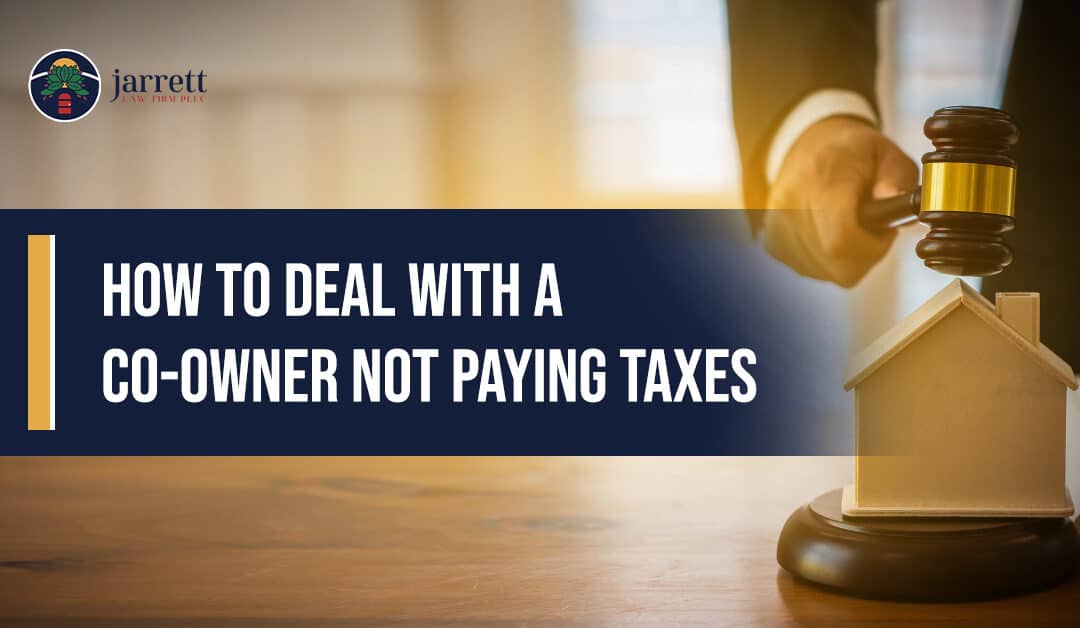Do you co-own a property with someone who isn’t paying their share of property taxes? It can be frustrating, especially if you’re left shouldering the financial burden. In our blog post, “Dealing With a Co-Owner Not Paying Taxes,” we’ll explore the challenges of a co-owner neglecting their tax responsibilities. We’ll also provide valuable insights and strategies to address this issue effectively. Whether you’re unsure about legal options or seeking practical solutions, we’ve got you covered. Let’s dive into the world of co-ownership and find ways to overcome this common challenge in Texas.
Types of Co-Owners in Texas
In Texas, joint property ownership disputes often occur. A common conflict is when co-owners don’t pay their taxes.There are three ways to own property jointly in Texas:
- Community property ( in a marriage relationship): Ownership is automatically without right-of-survivorship unless the couple signs right-of-survivorship agreements
- Joint Property (with or without right-of-survivorship). With right-of-survivorship, the arrangement is called “joint tenancy.” Without the right of survivorship, the term is “tenancy in common.”
- Life estate
Let’s look at how these types of real property and ownership work.
Community Property Ownership
In Texas, if you are a married couple, your property is considered community property by default.
Additionally, you can choose to possess the property jointly with the right-of-survivorship provision. This means when one spouse passes away, the surviving spouse will inherit without any complications or delays. With this provision, if either spouse passes away, the surviving partner would immediately become the sole owner of the property.
If you do not own the property with right-of-survivorship, when one spouse dies, the other spouse’s share of the property goes to their estate.
Joint Tenancy
As unmarried co-owners, if you own joint property with the right of survivorship, the property passes automatically to you upon their death. Since you have the right-of-survivorship clause, your partnership is a “joint tenancy,” with equal ownership shares. Should one owner pass away, the property passes to the remaining owner.
Tenancy by Common
However, if you own the property as joint tenants in common, you may own unequal property shares. You pay taxes equal to your amount of ownership. So if you own 40% of the property, you owe 40% of the property taxes. As tenants in common, you do not inherit a co-owner’s share if they pass away.
Life Estate Joint Owner
A life estate is how an older person often gives an heir an ownership interest. One option for transferring partial property ownership is through a life estate title. This type of joint ownership agreement limits the original owner’s authority over the entire property that’s sale or refinance, as they must obtain their co-owner’s consent before conducting any transactions.
While the life tenant lives on the property, they owe the property taxes.
If a Co-Owner Didn’t Pay Their Share of Taxes, Can I Sue?
According to Texas Property Code Ch. 29, you have legal options if co-property owners do not pay their taxes.
In simple terms, this law applies to situations where you co-own a piece of property with someone else, and that other person has not paid their share of property taxes.
The law allows you to ask the court to force the other person to sell their share of the property to you for reimbursement of property expenses.
How to File a Lawsuit for Reimbursement of Property Tax
To file a lawsuit to recoup the taxes you paid but did not owe, you must file a petition with the court in the county where the property is located. The petition should include the following:
- Description of the property
- Names of all the owners
- Amount of taxes you have paid for the other person
- Any reimbursement they have given you so far
The court will then hold a hearing where you have to prove that you have paid the other person’s unpaid taxes for a certain number of years and have asked them to reimburse you.
If you can provide clear and convincing evidence, the court will order the other person to sell their share of the property to you. The court will determine the value of their share jointly owned property through an independent appraisal and subtract any outstanding amount they owe you for taxes.
Once the court issues the order, the other person will have to transfer their share of the property to you, and you will pay them the amount determined by the court.
Working with an experienced local real estate attorney gives you the best shot at a successful endeavor when it comes to filing a lawsuit.
How to Negotiate Property Taxes With Non-Paying Co-Owners
When faced with a situation where co-owners are not paying their fair share of property taxes, it’s crucial to approach the matter with tact and strategy.
Negotiating property taxes with non-paying co-owners requires open communication, understanding of legal rights, and a willingness to find a mutually beneficial solution. Firstly, initiate a conversation with the co-owner to discuss their reasons for non-payment and express your concerns about the financial implications.
Explore the possibility of setting up a payment plan that accommodates both parties’ budgets and ensures the taxes are covered. If direct negotiations prove challenging, consider involving a mediator or seeking legal advice to facilitate the discussion.
Additionally, research the local laws and regulations about co-ownership and property taxes in your area to better understand your rights and potential courses of action. Ultimately, finding a middle ground and reaching an agreement that ensures the property taxes are paid promptly can help maintain a harmonious co-ownership arrangement.
However, when personal attempts to work it out fail, consider talking with a local real estate attorney who practices mediation. They can help you find common ground. And if the mediation fails, they can help you by filing a lawsuit and representing you for a court appearance.
Considering Negotiations or Mediation
A mediation attorney can objectively evaluate the situation with their knowledge of Texas law. They guide a discussion of potential resolutions while providing detailed insight into everyone’s options under Texas law.
The mediation process provides a system for resolving disputes where both parties agree to discuss their situation with a trained mediator. The mediator acts as a neutral third-party facilitator.
Through mediation, all parties can do the following:
- Share their perspectives
- Identify their needs and interests
- Work collaboratively towards a resolution that satisfies everyone involved
Mediation effectively resolves various legal disputes, including those related to real estate co-ownership.
How Does a Mediator Help?
During mediation, parties meet with a mediator to discuss their issues. The mediator listens to each party’s side of the story and helps them identify the underlying interests and concerns that drive their positions. The mediator then guides the parties to discuss possible solutions to address the interests and concerns.
Confidentiality is a key feature of mediation. Everything discussed during the session remains private, so all parties can speak freely without concern that their words will be used against them later. Confidentiality also helps to establish a safe and comfortable environment for parties to work towards a resolution.
Consulting with a legal or mediation specialist is essential when you can’t work out issues with a co-owner. The attorney’s real estate and interpersonal expertise can provide valuable insights and solutions to benefit all parties.
A mediation can ensure that everyone is well-informed about their legal rights. It also promotes fair and equitable property distribution while preserving essential relationships.
Our Experienced Real Estate Attorneys Can Help
Our experienced real estate attorneys at Jarrett Law can help you handle joint ownership disputes. With our in-depth knowledge of real estate laws and regulations, we can provide valuable guidance and advocate for your interests. Whether it’s negotiating with the non-paying co-owner, exploring legal remedies, or assisting with mediation, our attorneys have the expertise to find practical and fair solutions.
Approach your situation with confidence, knowing that you have a knowledgeable professional by your side to protect your rights. Let our experienced team help achieve the resolution you need.

